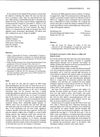Failure of Gluten-Free Diet in Celiac Disease-Associated Alopecia Areata
July 1998
in “
Acta Dermato Venereologica
”
TLDR A gluten-free diet does not help hair regrowth in celiac disease patients with alopecia areata.
The study by Bondavalli et al. (1998) concluded that a gluten-free diet was ineffective in treating alopecia areata associated with celiac disease. Despite adherence to the diet, patients did not experience significant hair regrowth, indicating that other factors might be involved in the pathogenesis of alopecia areata in celiac disease patients. This finding suggested that alternative therapeutic approaches should be considered for managing hair loss in these individuals.




